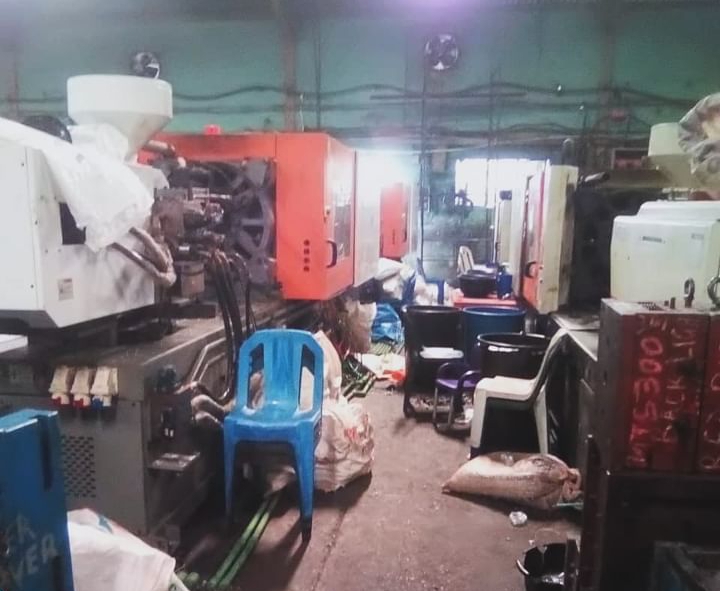Inside Monaplex plastic factory
The recent report by TheCable titled, “Lagos Slave factories (1): The plastic company where workers lose body parts in duty- and earn N 1,650 daily” is a sad reflection of the state of many workplaces in Nigeria. I sympathize with the employees who suffered bodily harm and were exposed to the indecent work conditions described in the article. I commend TheCable for writing about this and bringing to the fore the poor state of safety in the Nigerian workplace. The media is critical to the workforce’s safety, health and welfare, and TheCable has done a brilliant job.
Nigeria’s poor socio-economic situation provides the ecosystem for the problems highlighted in this story. The high unemployment rate has created an employer’s market. The lack of regulatory oversights has made some labour employers take undue advantage of the workers and subject Nigerians to exploitative tendencies. There is also the challenge of insecurity that has made people like the man in the story abandon his business because his motorbike was stolen.
The story highlights three critical issues. They are workplace safety, casual workers’ status, and the need for regulators to do their job.
Workplace Safety.
Advertisement
Nigeria has several laws and policies on workplace safety. In 1994, the Federal Government ratified ILO Convention No. 155 on Occupational Safety, Health and Working Environment. In addition, On 8 November 2022, the Government of the Federal Republic of Nigeria deposited to the ILO the instruments of ratification of the Promotional Framework for Occupational Safety and Health Convention, 2006 (No. 187) and the Violence and Harassment Convention, 2019 (No. 190). Also, in the 1999 constitution of the Federal Republic of Nigeria, Section 17.3c, “the state shall divert its policy towards ensuring that the health, safety and welfare of all persons in employment is safeguarded and not endangered or abused”.
In Nigeria, Employers have a duty of care for employees to promote a healthy and safe working environment. A duty of care is the obligation to act in good faith and with due diligence. Therefore, the law places a responsibility on employers to provide safe working conditions for their employees. This includes providing a healthy and safe work environment, safety equipment, training, and support for injured workers. According to the Factories Act, it is the duty of every employer to ensure, so far as is reasonably practicable, the safety, health, and welfare of all workers. Safe and healthy working conditions are critical to social justice and economic growth. Here are some key points from this policy:
Hazard Assessment: Workplace hazards in Nigeria can vary depending on the industry. It’s the duty of employers to recognize these hazards, mitigate them and eliminate them. In Manufacturing and Construction, the risk might be higher.
Advertisement
Occupational injuries are more common among manufacturing and construction workers. These workers are exposed to hazards from harmful substances, injury from tools and machinery, and physical strain from repetitive tasks. There is also a higher risk of moving machine injuries, including crushed limbs like fingers or hands, amputation, burns, or blindness.
Safe Working Environment: The law mandated Employers to provide a safe working environment for all workers. Therefore, machines and work equipment must be safe and not constitute worker hazards.
Training: Employers must ensure employees have the skills and knowledge to accomplish their jobs. They should also provide training about the preventive measures that must be taken to ensure health and safety at the workplace.
Health and Safety Measures: Employers must comply with the job’s health, safety, and occupational health requirements. They should also keep track of safety issues and correct them promptly.
Advertisement
Resources for Healthy Living: Employers might offer resources for healthy living and employee self-care. For example, they might offer onsite wellness programs and promote healthy food choices in the office.
Support for injured staff: The Employee Compensation Act of 2010 mandates all employers to contribute 1% of the total monthly payroll to the compensation fund. This fund compensates employees for occupational diseases and injuries sustained from an accident at the workplace or during employment.
The plastic company has violated all these rules and laws.
However, legal remedies are available to employees if an employer fails to fulfil their responsibilities. These include application for compensation under the Employee Compensation Act, 2010, and civil action against the employer at the National Industrial Court of Nigeria.
Advertisement
Casual work arrangements
Casual work arrangement (also known as Non-Standard Work Arrangement (NSWA)) in Nigeria generally describes work arrangements which do not fall within the traditional definition of employment. The term may also refer to fixed contracts, contract work, on-call work, part-time work, and temporary workers. Some employers assume that a casual worker doesn’t have any rights. But this needs to be corrected.
Advertisement
Section 91 of the Labour Act the Labour Act Cap L1 LFN 2004 defines a worker as “any person who has entered into or works under a contract with an employer, whether the contract is for manual labour or clerical work or is express or implied or oral or written and whether it is a contract of service or contract personally to execute any work or labour”. The Employees Compensation Act (ECA) defines an employee as:
“…a person employed by an employer under [an] oral or written contract of employment whether on a continuous, part-time, temporary, apprenticeship or casual basis and includes a domestic servant who is not a member of the family of the employer including any person employed in the Federal, State, and Local Governments, and any of the government agencies and in the formal and informal sectors of the economy”. So, casual workers are employees in Nigeria and can claim compensation under the Act.
Advertisement
The Court of Appeal (CoA) in Owena Mass Transportation Co. Ltd. v. Okonogbo ruled that “Traditionally, casual labour refers to work conducted for defined periods and during peak business periods…casual jobs are commonly understood as jobs that attract an hourly rate pay but very few of other rights and benefits, such as the right to notice, the right to severance pay and most forms of paid leave.” But the courts have held that casual WORKERS also have rights.
In Abel v Trevi Foundation Nigeria Ltd (unreported 2014 decision of the NICN in Suit No.: NICN/PHC/55/2013 delivered on 26 June 2014), The National Industrial Court placing reliance on the definition of “employee” in the Employees’ Compensation Act, extended the definition of an “employee” to include persons engaged on a temporary or casual basis. The NICN has clearly and consistently ruled that a contract staff who sustained injuries in the course of his employment is an employee of the defendant and, therefore, entitled to compensation for injuries sustained in the course of his employment with the employer.
Advertisement
The National Industrial Court in Patovilki Industrial Planners Limited v National Union of Hotels and Personal Services Workers ruled that casual workers can form and join trade Unions.
Also, Section 7 of the Labour Act provides that by three months after a worker’s employment begins, the employer shall give him a written statement of employment containing the terms and conditions of employment. In the case of Fatai Oyekunle V. Abel Sell LTD and Henry Boyo, a casual worker with no employment contract was fired without notice or retirement benefits after working for about 22 years. The court held that not giving him a letter of employment was a breach of the Labour Act, which mandates an employer to issue an employee a written statement stipulating the terms of the employment ‘within three months’ of such employment. Again, this shows that casual workers can approach the court to insist on their rights.
Regulatory Management of Workplace Safety.
The Federal Ministry of Health and the Federal Ministry of Labour & Productivity are the two most critical organizations responsible for workplace safety. Other organizations have sector-specific responsibilities. One essential part of this role is undertaking frequent inspections and ensuring compliance. Companies like the one in the story can get away with their atrocities because the regulators have not been effective.
In addition, the national assembly needs to review the laws related to the workplace in Nigeria. In 2020, The House of Representatives passed for a second reading a bill – Labour Act (Amendment) Bill 2019 seeking to criminalize the maintenance of casual workers, also known as contract staff, beyond six months by any employer. The short title of the legislation reads, ‘A Bill for an Act to Prohibit and Criminalise Casualisation of Workers After Six Months of Engagement by Employers in Nigeria, Outsourcing Employment in Core Areas of Operation and Other Related Matters.’ will also prohibit outsourcing of jobs to third parties by employers. Sadly, the bill wasn’t passed into law.
Regulators in Nigeria need to focus more attention on issues related to the workplace. Nigeria has ratified over 40 ILO Conventions, including all eight core conventions; therefore, we must ensure we live up to the expectations of those conventions.
Conclusion:
Nigeria needs to ensure that workplaces are safe. Doing this supports the Decent work agenda and advances the sustainable development agenda. Unsafe workplaces are dangerous, and the state must ensure workplaces are safe. The four pillars of the ILO Decent Work Agenda, which include promoting jobs and enterprise, guaranteeing rights at work, extending social protection, and promoting social dialogue, must be reflected in all work situations in Nigeria. All stakeholders must work together to promote safety in the workplace.
Views expressed by contributors are strictly personal and not of TheCable.







